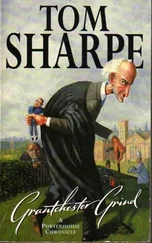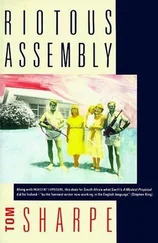The Bursar sympathized with Sir Godber. “Not a very likeable fellow but he’s very conscientious and he is a great favourite of the Dean.”
“I can imagine that they get on well together,” said Sir Godber. “All the same, Porterhouse may be the name of the College but it doesn’t mean that the Head Porter is in charge. On the night of the… er… accident Skullion was distinctly disrespectful. I told him to open the main gates for the ambulancemen and he refused. One of these days I daresay I shall have to ask you to give him notice.”
The Bursar blanched at the thought. “I think that would be most inadvisable, Master,” he said. “The Dean would be most upset.”
“Well,” said Sir Godber, “the next time I have any insolence from him out he goes and no mistake.” With the silent thought that it was time such relics of the past got their marching orders, the Master led the way into the Lodge.
Lady Mary was waiting in the drawing-room. “I’ve asked the Bursar to lunch, my dear,” said Sir Godber, his voice a shade less authoritative in the presence of his wife.
“I’m afraid you’ll just have to take pot luck,” Lady Mary told the Bursar. “My husband tells me that you treat yourselves lavishly at High Table.”
The Bursar simpered apologetically. Lady Mary ignored these signs of submission. “I find it quite deplorable that so much good money should be wasted on maintaining the ill-health of a number of elderly scholars.”
“My dear,” Sir Godber intervened, “you’ll be glad to hear that the Council has accepted our proposals.”
“And not before time,” said Lady Mary, studying the Bursar with distaste. “One of the most astonishing things about the educational institutions of this country is the way they have resisted change. When I think how long we’ve been urging the abolition of private education I’m amazed. The public schools seem to go from strength to strength.”
To the Bursar, himself the product of a minor public school on the South Downs, Lady Mary’s words verged on the blasphemous. “You’re surely not suggesting public schools should be abolished,” he said. From the table where Sir Godber was pouring sherry there came the sound of rattled glass. Lady Mary assumed a new hauteur.
“Am I to infer from that remark that you are in favour of private education?” she asked.
The Bursar groped for a conciliatory reply. “Well, I think there is something to be said for it,” he mumbled finally.
“What?” asked Lady Mary.
But before the Bursar could think of anything to recommend the Public School system without offending his hostess. Sir Godber had come to his rescue with a glass of sherry. “Very good of you. Master,” he said gratefully and sipped his drink. “And a very pleasant sherry, if I may say so.”
“We don’t drink South African sherry,” Lady Mary said. “I hope the College doesn’t keep any in stock.”
“I believe we have some for the undergraduates,” said the Bursar, “but I know the Senior Members don’t touch the stuff.”
“Quite right too,” said Sir Godber.
“I was not thinking of the question of taste,” Lady Mary continued, “so much as the moral objections to buying South African products. I have always made a point of boycotting South African goods.”
To the Bursar, long accustomed to the political opinions expressed at High Table by the Dean and the Senior Tutor, Lady Mary’s views were radical in the extreme and the fact that they were expressed in a tone of voice which suggested that she was addressing a congregation of unmarried mothers unnerved him. He stumbled through the thorny problems of world poverty, the population explosion, abortion, the Nicaraguan earthquake, strategic arms limitation talks, and prison reform until a gong sounded and they went into lunch. Over a sardine salad that would have served as an hors d’oeuvre in Hall his discomfiture took a more personal turn.
“You’re not by any chance related to the Shropshire Shrimptons?” Lady Mary asked.
The Bursar shook his head sorrowfully.
“My family came originally from Southend,” he said.
“How very unusual,” said Lady Mary. “I only asked because we used to stay with them at Bognorth before the war. Sue Shrimpton was up with me at Somerville and we served together on the Needham Commission.”
The Bursar acknowledged Lady Mary’s social distinction in silence. He would put his present humiliation to good use in the future. At sherry parties for years to come he would be able to say “Lady Mary was saying to me only the other day…” or “Lady Mary and I…” and establish his own superiority over lesser men and their wives. It was in such small achievements that the Bursar’s satisfactions were found. Sir Godber ate his sardines in silence too. He was grateful to the Bursar for providing a target for his wife’s conversation and moral rectitude. He dreaded to think what would happen if the injustices on which Lady Mary vented her moral spleen ever disappeared. “The poor are always with us, thank God,” he thought and helped himself to a piece of cheddar.
It was left to Skullion to represent the College on the towpath that afternoon. The Dean had driven over to Coft to see Sir Cathcart and Skullion stood alone in the biting wind watching Porterhouse row over for the second day running. The terrible sense of wrong that he had felt in the boiler-room when he heard the proposed sale of Rhyder Street had not left him. It had been augmented by the news Arthur had brought him from High Table after lunch.
“He’s put the cat among the pigeons now, the Master has,” Arthur said breathlessly. “He’s got under their skin something terrible this time.”
“I don’t wonder,” said Skullion, thinking bitterly of Rhyder Street.
“I mean you wouldn’t want one in your own home, would you? Not one of them things.”
“What things?” Skullion asked, all too conscious of the fact that he was unlikely to have a home to put anything in if Sir Godber had his way.
“Well I don’t rightly know what they’re called,” Arthur said. “Not exactly, that is. You put your money in and…”
“And what?” Skullion asked irritably.
“And you get these things out. Three I think. Not that I’ve ever had occasion to use them.”
“What things?”
“Frenchies,” said Arthur, looking round to make sure no one was listening.
“Frenchies?” said Skullion. “What Frenchies?”
“The Frenchies that Zipser gentleman exploded himself with,” Arthur explained. Skullion looked at him in disgust. “You mean to tell me they’re going to bring one of those filthy things into the College?”
Arthur nodded. “In the men’s toilet. That’s where it’s going.”
“Over my dead body,” said Skullion. “I’m not staying here as Head Porter with one of those things in the toilet. This isn’t a bloody chemist’s shop.”
“Some of the other colleges have them,” Arthur told him.
“Some of the other colleges may have them. Doesn’t mean we’ve got to. It isn’t right. Encourages immorality, French letters do. You’d have thought they’d have learnt that from what happened to that Zipser bloke. Preyed on his mind, all those FLs did.”
Arthur shook his head sorrowfully. “T’isn’t right,” he said, “t’isn’t right, Mr Skullion. I don’t know what the College is coming to. Senior Tutor is particularly upset. He says it will affect the rowing.”
Standing on the towpath Skullion agreed with the Senior Tutor. “All this business about sex,” he muttered. “It doesn’t do anybody any good. It isn’t right.”
When the Porterhouse Eight rowed past Skullion raised a feeble cheer and then stumped off after them. Around him bicycles churned the muddy puddles as they overtook him but, like the Dean the day before, Skullion was lost in thought and bitterness.
Читать дальше












